

Three Significant Obstacles to Creating a Personal Learning Network. Last weekend, after enjoying Joe Morelock's keynote about the facing the challenges of rapid change in education, I shared my thoughts on personalized professional development with a group of about twenty eager educators.
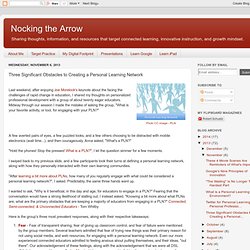
Midway through our session I made the mistake of asking the group, "What is your favorite activity, or tool, for engaging with your PLN? " A few averted pairs of eyes, a few puzzled looks, and a few others choosing to be distracted with mobile electronics (wait time...), and then courageously, Anna asked, "What's a PLN? " "Hold the phones! Stop the presses! File:Lifelong learning, 2006 and 2011 (1) (% of the population aged 25 to 64 participating in education and training).png. iPhone 5s vs 50 cal - RatedRR Slow-Mo Torture Test. Disrupting the Diploma.
Lifelong learning and Schools as Community Learning Centres: Key aspects of a National Curriculum Draft Policy Framework for Malta. The island of Malta has been engaged in policy document formulations for curriculum renewal in the country’s educational system (4-16 years of age) since 1988 when the first National Minimum Curriculum (henceforth NMC) was launched (Wain, 1991; Borg et al, 1995).
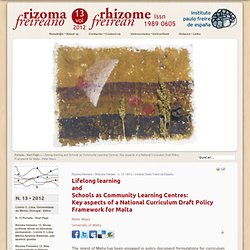
In 1999 a revamped NMC (Ministry of Education, 1999) was developed following a long process of consultation involving various stages and stakeholders. It was a compromise document (Borg & Mayo, 2006) which emerged as a result of reactions to a more radical and coherent draft document produced in 1988. Both curricular documents were subject to debates and critiques (Wain, 1991; Darmanin, 1993; Borg et al, 1995; Giordmaina, 2000; Borg and Mayo, 2006). 7 Ways Teachers Use Social Media in the Classroom. Millennials live and breathe on social media, so teachers are learning how to incorporate the medium into the classroom successfully.
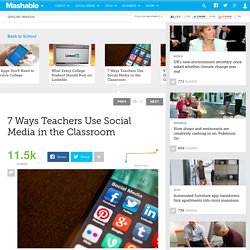
In doing so, teachers not only encourage students to engage actively in the material, but they also provide online communities for students that might not exist for them in real life. But how are teachers infusing social media into their everyday lessons? We've highlighted several different examples and offered our own ideas on how to best engage students. 1.
Encourage students to share work socially. Anna Divinsky created an iTunes U class at Penn State University called Art 10: Introduction to Visual Studies, which she then adapted into a massive open online course (MOOC) on Coursera. How To Tackle Digital Citizenship During The First 5 Days Of School. A More Beautiful Question. TED Prize winner Sugata Mitra is reframing the way we think about learning A couple of months ago, I stumbled across the work of Dr.
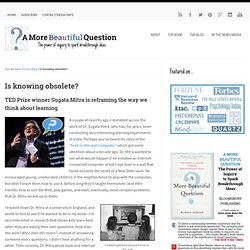
Sugata Mitra, who has, for years, been conducting very interesting learning experiments in India. Perhaps you’ve heard his story of the “hole-in-the-wall computer,” which got some attention about a decade ago. Dr. Mitra wanted to see what would happen if he installed an Internet-connected computer at kid’s-eye level in a wall that faced out onto the street of a New Delhi slum. STOP STEALING DREAMS: Seth Godin at TEDxYouth@BFS. A glimpse into the future of learning. How Students Are Using The Internet For Studying. Does anyone out there remember actually having to go to the library to research for a paper?
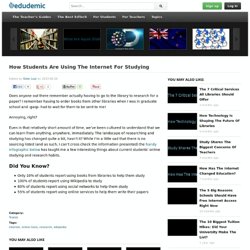
I remember having to order books from other libraries when I was in graduate school and -gasp- had to wait for them to be sent to me! Annoying, right? Even in that relatively short amount of time, we’ve been cultured to understand that we can learn from anything, anywhere, immediately. The landscape of researching and studying has changed quite a bit, hasn’t it? While I’m a little sad that there is no sourcing listed (and as such, I can’t cross check the information presented) the handy infographic below has taught me a few interesting things about current students’ online studying and research habits.
Only 10% of students report using books from libraries to help them study 100% of students report using Wikipedia to study 80% of students report using social networks to help them study 55% of students report using online services to help them write their papers. Getting young people fluent in digital. What do you get when you mix unemployed young people with a blended learning incubator in digital skills?
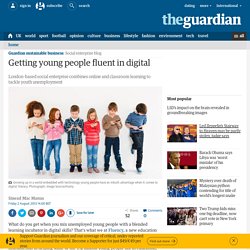
That's what we at Fluency, a new education technology startup, plan to find out. We hope that our unique method of training young people in the skills that small businesses in the UK need, will be instrumental in helping some of the 1.4 million young people not in education, employment or training in the UK into sustainable employment. Fluency is an education platform helping small businesses succeed online, while at the same time getting unemployed youth into great jobs in the digital economy. The social venture started as a series of pilots funded by UnLtd and the Nominet Trust to train low income women with digital skills that are in demand so that they could become digital freelances. The Fluency platform trains small businesses with the skills they need to succeed online: social media marketing, email marketing and search engine optimisation. Lessons Worth Sharing. How Teachers Can Stop Being Scared Of Twitter. November’s EdTechTeacher’s iPad Summit (which, by the way, I found through Twitter) completely amazed, overwhelmed, challenged, and inspired me.
I left feeling empowered about the 1:1 iPad environment in which I was teaching and excited about the possibilities of technology inside and outside of my classroom. My Twitter Addiction I also left the conference with a mild addiction to Twitter. Mild as in I stopped taking notes within the first 5 minutes of the keynote when I realized that I could just tweet the links for great resources, apps, articles, images, videos… And went from following one or two people to dozens of the brightest stars in the edtech realm – including the EdTechTeacher staff and some pretty amazing teachers I met at the conference.
Zack Matere: Growing Knowledge. Learning Theory - What are the established learning theories? Lessons Worth Sharing.